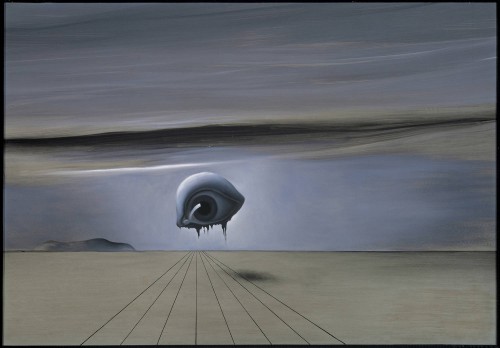BBM 413 - Fundamentals of Image Processing (Fall 2015)
Lectures: Thursday 09:00-11:45 @D8
Practicum (BBM415): Friday 09:30-12:00 @D10

Salvador Dali’s Study for the Dream Sequence in Spellbound (1945)
Instructor: Erkut Erdemerkut-at-cs-hacettepe.edu.tr114 +90 312 297 7500, 149 |
TA: Aysun Kocakaysunkocak-at-cs-hacettepe.edu.trComputer Vision Lab +90 312 297 7500, 152 |
Course Description
The subject matter of this advanced undergraduate course is about the fundamentals of image processing. The course is structured around key topics in image processing, including image formation, point operations and histogram processing, spatial filtering techniques, frequency domain approaches, image smoothing, edge detection and image segmentation. The main aim of this course is to provide an introduction to students who wish to specialize in interrelated disciplines like image processing, computer vision and computational photography. The students are expected to develop a foundational understanding and knowledge of concepts that underly image processing and related fields. The students will also be expected to gain hand-on experience via a set of programming assignments supplied in the complementary BBM 415 Image Processing Practicum. Hence, the students are strongly advised to register both BBM 413 and BBM 415 classes.Prerequisites
Good math (calculus, linear algebra, statistics) and programming skills. Students are not expected to have any prior knowledge of image processing techniques.Textbooks
- (S) Computer Vision: Algorithms and Applications, Richard Szeliski, Springer, 2010 (draft available online).
- (GW) Digital Image Processing, R. C. Gonzalez, R. E. Woods, 3rd Edition, Prentice Hall, 2008
Grading
- 12% Written Assignments
- 16% Quizzes
- 32% Midterm Exam
- 40% Final Exam
Schedule (Tentative)
| Week | Date | Topic | From the book | Notes |
|---|---|---|---|---|
| 1 | Sep 17 | Introduction | S1 | Slides: (pdf, 4pp) Reading: D. Marr, Vision, The Philosophy and the Approach, 1982 |
| 2 | Sep 24 | No class (Religious Holiday) | ||
| 3 | Oct 1 | Image formation and the digital camera | S2.1-2.3.1 | Slides: (pdf, 4pp) Lab material: (pdf) |
| 4 | Oct 8 | Color perception and color spaces | S2.3.2 | PA1 out (pdf, code, images) Slides: (pdf, 4pp) Reading: Beau Lotto's TED Talk: Optical illusions show how we see Lab material: (pdf) |
| 5 | Oct 15 | Point operations | S3.1, GW3.1-3.3 | Slides: (pdf, 4pp) Lab material: (zip) |
| 6 | Oct 22 | Spatial filtering | S3.2-3.3 | PA1 due, PA2 out: (pdf) Slides: (pdf, 4pp) Lab material: (zip) |
| 7 | Oct 29 | No class (Republic Day) | ||
| 8 | Nov 5 | Frequency Domain Techniques | S3.4, GW4.1-4.10 | PA2 due Slides: (pdf, 4pp) |
| 9 | Nov 12 | Frequency Domain Techniques (cont'd.) | S3.4, GW4.1-4.10 | PA3 out: (pdf) Slides: (pdf, 4pp) Lab material: (zip) |
| 10 | Nov 19 | Midterm Exam | ||
| 11 | Nov 26 | Image pyramids and wavelets | S3.5, GW7.1-7.5 | PA3 due, PA4 out: (pdf, code and data) Slides: (pdf, 4pp) Reading: A. Oliva, A. Torralba, P.G. Schyns, Hybrid Images, ACM Transactions on Graphics, ACM SIGGRAPH, 25-3, 527-530, 2006 Applications: Eulerian Video Magnification, Phase-Based Video Motion Processing |
| 12 | Dec 3 | Gradients, edges, contours | S4.2,4.3.1-4.3.2 | Slides: (pdf, 4pp) Reading: D. Marr and E. Hildreth, Theory of Edge Detection, Proc. R. Soc. Lond. B, 1980 |
| 13 | Dec 10 | Image segmentation | S5.1-S5.2 | PA4 due, PA5 out: (pdf) Slides: (pdf, 4pp) Reading: E. Borenstein and S. Ullman, Class-Specific, Top-down Segmentation, ECCV 2002 |
| 14 | Dec 17 | Image segmentation (cont'd) | S5.3-5.5 | Slides: (pdf, 4pp) |
| 15 | Dec 24 | Image smoothing - revisited | S3.2 | PA5 due Slides: (pdf, 4pp) |
Additional Resources:
- MATLAB Resources:
- Introduction to MATLAB, by Danilo Šćepanović
- MATLAB Tutorial, by Stefan Roth
- MATLAB Primer, by MathWorks
- Code Vectorization Guide, by MathWorks
- Writing Fast MATLAB code, by Pascal Getreuer
- MATLAB array manipulation tips and tricks, by Peter J. Acklam
- Linear Algebra:
- A Geometric Review of Linear Algebra, by Eero Simoncelli
- An Introduction to Linear Algebra in Parallel Distributed Processing, by M.I. Jordan
Communication:
The course webpage will be updated regularly throughout the semester with lecture notes, programming and reading assignments and important deadlines. All other communications will be carried out through Piazza. Please enroll it by following the link https://piazza.com/hacettepe.edu.tr/fall2015/bbm413Policies:
All work on assignments must be done individually or a group of two unless stated otherwise. You are encouraged to discuss with your classmates about the given assignments, but these discussions should be carried out in an abstract way. That is, discussions related to a particular solution to a specific problem (either in actual code or in the pseudocode) will not be tolerated.In short, turning in someone else’s work, in whole or in part, as your own will be considered as a violation of academic integrity. Please note that the former condition also holds for the material found on the web as everything on the web has been written by someone else.
© 2015 Hacettepe University